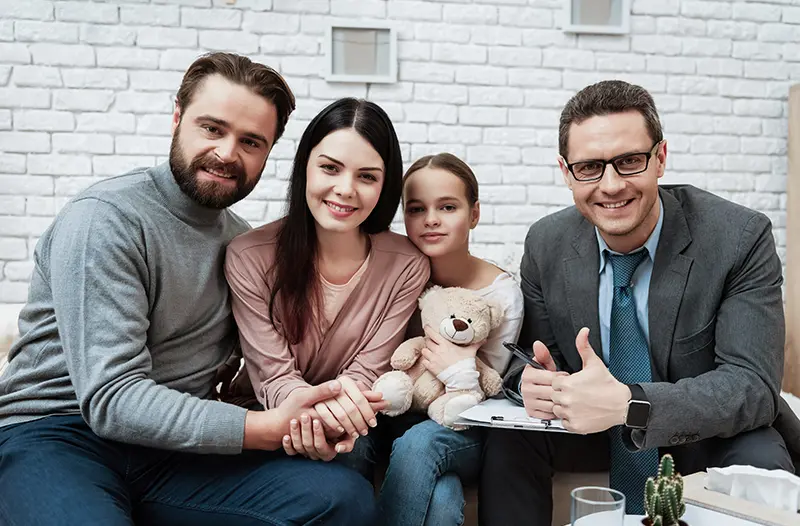The wellbeing of divorcing and separating families is the reason collaborative practitioners do what they do. Collaborative practitioners you ask? Yes, we are one of the best kept secrets in the Family Law sector.
Successive Australian governments have made efforts to find cost efficiencies in the family law system, and a focus on the clients of the system has come second. Our concern is how separating families are going to be affected by the fact that interdisciplinary collaborative teams have not gained the due attention of the Commonwealth. Regardless of that, and also because of it, we think it is important for counselling professionals to have an understanding of this powerful form of Dispute Resolution, which focuses on whole families, seeing separation as primarily an emotional crisis.
Psychologists in the Court System and the collaborative alternative
The counselling services of the courts do a sterling job, but the jurisdictional limits on their role, and the lack of resources are real limitations. Despite the best efforts of the counsellors and psychologists who work in the system, traditional family law remains expensive, confusing, damaging and protracted.
Psychologists who work in the court system, who give evidence there, or work with clients going through it, all know deeply that the help they can give is limited by the time a case is in court. Litigation is counter to therapeutic work, and most psychologists who are working therapeutically with people do not want to become involved in their client’s litigation.
The outcome of litigation inevitably means that Court Orders are made and need to be lived by. There is a point of real tension for a psychologist who wants to help people manage their life, and the imposing of Orders which are not accompanied by any blueprint for how people are to live their life, including how they are to live with the Orders.
Many people think all family lawyers cost a fortune and make the conflict worse. Psychologists look and wonder why their expertise is not fully utilised in traditional negotiations and the family court system. Many external agencies will withdraw from a family or an individual when they end up in litigation, because of the understandable reluctance to be drawn into litigation. That being so, let’s take a closer look at the possibilities for civilised separations where psychologists are integral to team work with separating couples and their children.
It is not well known, but interdisciplinary collaborative teams are working responsively with separating families. And they are doing so with great success, helping families find a way to move forward, rather than tearing them apart. An interdisciplinary collaborative team is comprised of specially trained professionals; a lawyer for each spouse, a neutral counsellor/psychologist for the case, and a neutral financial planner. There will usually be a child psychologist work in a non-reportable, child inclusive role as part of the team.
What makes collaborative practice effective?
This is not just an alternative, but one that gives a better or the best possible outcome for families. This idea brings people to the table, with a common focus on their children, and the work of the team assists the whole family. In fact, it is the family, not one of the parents or spouses who is seen as the client, and a systems approach is taken to the work.
There are many ways in which this model is superior to the alternatives. When there are family law parenting issues, work needs to be done with both parents. The problems usually lie in the fractured parental relationship, and if you work with that, there are positive therapeutic outcomes for the whole family. This is really at the heart of the children’s work done in the collaborative model.
Sometimes one spouse is simply not ready to work on the decisions they face after separation. With this approach, that person can be referred to a psychologist, and the process waits. In court or adversarial negotiations, people can be reluctant to engage in an openly therapeutic process, and the process does not wait for them. There are other needs to be met for separating spouses. We believe that damaged people with mental health issues are over represented in separation, and collaborative teams can respond to those needs, which again cannot be realistically addressed or taken into account in the court system.
There are several models of collaborative practice, but the team model embeds the team from the start, although around the world there are different practises for creating interdisciplinary teams and setting up client intakes. It is important to note that the different disciplines are all ‘gatekeepers’ of this process, and any of the professions can take on the role of establishing collaborative teams. This is one of the features that most distinguishes team collaborative practice, as every other mode of settlement or Dispute Resolution is dominated by the thinking and practice that lawyers are the gatekeepers.
Psychologists on collaborative teams
As psychologists who have worked in the family court and family law system for many years, we observe the difference in team collaborative approaches as being that the work we can do is constructive; we can work with the parents and the children, and we firmly believe you can’t work with the children unless you are working with the parents. The work surrounding arrangements for the children after separation is integrated with all the other work that is done with the couple.
Another great benefit of this model is that the team can work with psychologists and other external agencies, without the threat of litigation. We know that litigation derails the healing of the couple, partly because it ends end having them fight their old fights.
The collaborative team at work
MELCA is a Melbourne based organisation, and has a specific model of collaborative practice which is described here to give a sense of the progression of a couple through a collaborative process. The team approach is the default approach in Victoria these days. Other states of Australia also work in teams, each with their own ways of establishing their teams. A team comprises one or all of a psychologist, a child psychologist, a financial planner, plus a lawyer for each parent/spouse. The team takes a collaborative approach and helps families to reach mediated agreements about their children and their money.
Couples start work by attend together for information about how they can use the approach to settle up, and to work out parenting plans and child support. They then attend a sophisticated intake where they spend several hours meeting the neutral psychologist/counsellor, neutral financial planner, and their independent lawyer. This complex intake is possible for any practice. After a team consultation, a scope of work is offered to a family at a fixed fee, based on what the team has learned about the unique needs of that family. Fixed fees are not part of every collaborative practice, but even so, teams are cost efficient due to the effectiveness of their work.
Many clients meet with the child psychologist before speaking to their children about the separation, and many of them take the opportunity for the child psychologist to check in with their children, reassure them, and help parents to create parenting plans based on the work with the family. The usual scope of work relating to finances is for a couple to meet in negotiation meetings with their team, two or three times, and for the lawyers then to write up agreements in the usual legal documents.
There is careful coaching, preparation, support and financial gathering for the couple before they begin their negotiations.
Team roles
The role of the psychologist on the collaborative team is to support the clients to bring their best self to the collaboration, to support the team dynamic, and to chair negotiation meetings at which all team members are present. The psychologists seek to actively engage with any individual therapist who is working with the family or any member of the family, but is not working as a therapist when part of the collaborative team.
The collaborative lawyers who work in these teams are allied to their individual client, ensuring that what is important is discussed, but in a way that is mindful of the wellbeing of the whole family. Advocacy is no longer about winners and losers, but seeking to contain conflict and to do no harm to the whole family.
The financial planners on the team are likewise not giving individual financial planning advice. They are there to gather the financial information from both spouses, to help with budgets for parents and children in the future, to interpret the individuals’ relationship to money for the team, and to educate clients so that they have a similar understanding about their finances.
The teams are carefully selected for each family after the information session, all team members have extensive experience in their field of expertise, and deep training and commitment to the model. Each member of the team is recognised as having equal value, and to that end they are all paid the same rate.
The international research on collaborative practice is from the USA, and is now somewhat dated, being 2015, and was conducted by the IACP (International Academy of Collaborative Professionals). Anecdotally, the picture from the USA is similar to the experience of practitioners in Australia, but there is yet to be any public peer reviewed research completed in Australia. So what is the role of the psychologist? It may be to:
- work as part of collaborative teams, either as a child specialist or as a neutral psychologist/communication coach
- provide therapeutic support for an individual, being fully aware of the settlement model they are working in
- refer clients into a constructive process that avoids court
Note: Definition of the court system included adversarial negotiation between lawyers.


